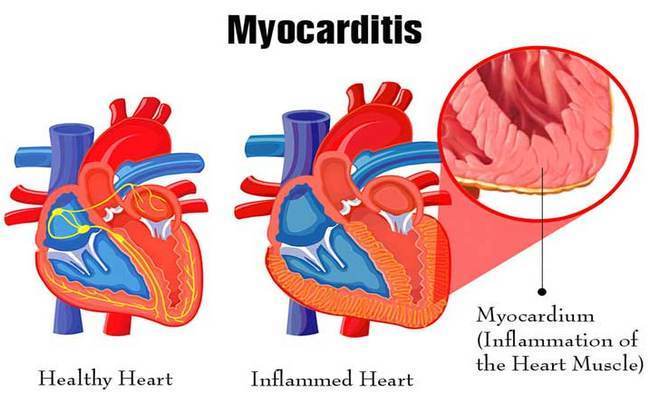Post-COVID Myocarditis: Medical Community Divided On Using Cardiac MRI Screening For All Post COVID-19 Patients Especially Asymptomatic Patients
Source: Post-COVID Myocarditis Sep 21, 2020 5 years, 2 months, 3 weeks, 6 days, 20 hours, 44 minutes ago
Post-COVID Myocarditis: As a result of alarming data showing that a majority of recovered COVID-19 patients have some sort of heart tissue damage after being infected with the SARS-CoV-2 coronavirus irrespective of whatever the conditions they had endured ie from mild, moderate , severe or asymptomatic, there is a huge rush by many concerned to go for heart screenings.
https://www.thailandmedical.news/news/breaking-covid-19-causing-an-unprecedented-heart-crisis-all-recovered-patients-urged-to-go-for-heart-screenings-even-asymptomatic-individuals

It is critical to diagnose for myocarditis in order to prevent further heart damage and basic screening methods to test for the presence of myocarditis might include:
1. Electrocardiogram (ECG). This noninvasive test shows your heart's electrical patterns and can detect abnormal rhythms.
2. Chest X-ray. An X-ray image shows the size and shape of your heart, as well as whether you have fluid in or around the heart that might indicate heart failure.
3. Echocardiogram. Sound waves create moving images of the beating heart. An echocardiogram might detect enlargement of your heart, poor pumping function, valve problems, a clot within the heart or fluid around your heart.
4. Blood tests. These measure white and red blood cell counts, as well as levels of certain enzymes that indicate damage to your heart muscle. Blood tests can also detect antibodies against viruses and other organisms that might indicate a myocarditis-related infection.
5. Cardiac catheterization and endomyocardial biopsy. A small tube (catheter) is inserted into a vein in your leg or neck and threaded into your heart. In some cases, doctors use a special instrument to remove a tiny sample of heart muscle tissue (biopsy) for analysis in the lab to check for inflammation or infection.
A more frequently employed diagnostic method is the Cardiac MR which will show your heart's size, shape and structure. This test can show signs of inflammation of the heart muscle.
However, a multidisciplinary medical group in America is urging against general population screening using this mode ie Cardiac MRI.
Although Cardiac MRI (CMR) might be able to find abnormalities suggestive of myocarditis after COVID-19 recovery or to rule them out but it shouldn't be used that way in the absence of symptoms, a group of cardiologists, radiologists, and others argued.
An open letter signed by some 50 medical professionals from a range of disciplines warned, "We wish to emphasize that the prevalence, clinical significance and long-term implications of CMR surrogates of myocardial injury on morbidity and mortality are unknown."
https://assets.documentcloud.org/documents/7208864/Letter-About-Asymptomatic-COVID19-CMR.pdf
The group argued that until there's better evidence, "testing asymptomatic members of the general public after COVID-19 is not indicated outside of carefully planned and approved research studies with appropriate control groups.”
The open letter called on the 18 professional societies to which it was sent, including the American College of Cardiology (ACC), American Heart Association, American College of Radiology, and the Society for Cardiovascular Magnetic Resonance (SCMR) to put out clear guidance to stop people seeking CMR screening for that purpose.
The Society for Cardiovascular Magnetic Resonance (SCMR) also agrees that routine CMR in asymptomatic patients after COVID-19 "is currently not justified... and it should not be encouraged."
Both public statements did not specifically address athletes.
The controversy flared up with a German study that turned up late gadolinium enhancement and other abnormalities on CMR suggesting myocardial injury and inflammation in a group of people who recovered from largely mild or moderate cases of COVID-19 compared with healthy controls and risk factor-matched controls.
https://jamanetwork.com/journals/jamacardiology/fullarticle/2768916 and
https://jamanetwork.com/journals/jamacardiology/fullarticle/2770026
Subsequently Ohio State University researchers last week published data on CMR scans of collegiate athletes after asymptomatic or mild SARS-CoV-2 infection: 15% had findings suggestive of myocarditis and 31% had LGE without T2 elevation, suggestive of prior myocardial injury.
https://jamanetwork.com/journals/jamacardiology/fullarticle/2770645
Both studies were used by various entities for making decisions about the safety of sports.
However the German group was cautious about interpretation. However, the Ohio State researchers wrote that CMR could potentially separate a high-risk group from those athletes safe for participation, "because CMR mapping techniques have a high negative predictive value to rule out myocarditis."
That's a bad idea for the general public, according to the letter, which noted that people have been seeking out CMR for asymptomatic screening.
"My own personal opinion is that casual athletics would be included but that elite athletes might not," said the first author on the letter, Dr Venkatesh Murthy, MD, PhD, of the University of Michigan in Ann Arbor. (a rather unclear statement though that does not justify their reasons)
Currently in the U.S., all athletes who test positive for the coronavirus will have to undergo comprehensive cardiac testing, including CMR, and get clearance from a university-designated cardiologist. The earliest a player can return to competition after testing positive is 21 days.
Standard guidance from the ACC's Sports & Exercise Cardiology Council on return to play calls for normalization of ventricular function, absence of biomarker evidence of inflammation, and absence of inducible arrhythmias with risk stratification after 3 to 6 months of exercise restrictions and "based on extensive testing including echocardiography, stress testing, and rhythm monitoring."
However for athletes, with even asymptomatic infection, it recommended that "cardiac testing should be considered if there is concern for cardiac involvement," the guidance states.
It is still unclear as to why the group of doctors are against the usage of cardiac MRI to detect presence of myocarditis which does not have any side effects.' Perhaps they were just seeking some media attention' according to other doctors and cardiologists.
For more on
Post-COVID Myocarditis, keep on logging to Thailand Medical News.
